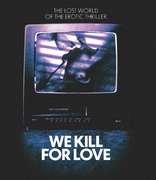We Kill for Love Blu-ray Movie
HomeWe Kill for Love Blu-ray Movie 
Slipcover in Original PressingYellow Veil Pictures | 2023 | 163 min | Unrated | Oct 31, 2023
Movie rating
7.2 | / 10 |
Blu-ray rating
| Users | 0.0 | |
| Reviewer | 4.0 | |
| Overall | 4.0 |
Overview
We Kill for Love (2023)
A documentary that goes in search of the forgotten world of the direct-to-video erotic thriller, an American film genre that once dominated late night cable television and the shelves of neighborhood video stores.
Starring: Blain Brown, George S. Clinton, Barry L. Collier, James Dearden, Jodie FisherDirector: Anthony Penta
| Documentary | 100% |
Specifications
Video
Video codec: MPEG-4 AVC
Video resolution: 1080p
Aspect ratio: 1.78:1
Original aspect ratio: 1.78:1
Audio
English: DTS-HD Master Audio 2.0 (48kHz, 24-bit)
Subtitles
English SDH
Discs
Blu-ray Disc
Single disc (1 BD)
Playback
Region A (C untested)
Review
Rating summary
| Movie | 3.5 | |
| Video | 4.0 | |
| Audio | 4.5 | |
| Extras | 3.5 | |
| Overall | 4.0 |
We Kill for Love Blu-ray Movie Review
Reviewed by Brian Orndorf October 8, 2023When the words “erotic thriller” are uttered, usually only one person comes to mind: Shannon Tweed. Director Anthony Penta seeks to change such awareness with “We Kill for Love,” which is a documentary about the controversial subgenre, which was developing long before Tweed was even born, and continues after her retirement from acting. There’s an entire history to explore here, with erotic thrillers developing rapidly over the decades, eventually exploding in the 1980s and ‘90s, and the helmer is determined to sniff around every corner of interpretation and thought. And I mean every. last. one. There’s a lot to “We Kill for Love,” which runs a whopping 163 minutes in length -- a major sit for a subject that could probably be successfully examined in an hour and a half with judicious editing and a more focused approach. Penta is determined to oversee a behemoth production to make his fine points understood, and he’s not having a whole lot of fun with it, as the endeavor is more analytical than anecdotal, going the chilly “Room 237” route with a stern, film theory-style approach, which is undeniably interesting, but with this absurd run time, it occasionally feels like running a marathon with no finish line.
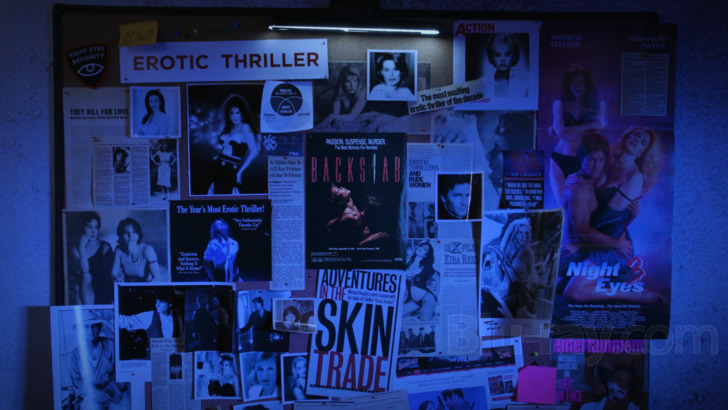
“We Kill for Love” offers an eight-minute-long prologue that attempts to summarize the world of the erotic thriller for those who’ve dared to not think too deeply about it all. Leadership is provided by film historian Linda Ruth Williams, with her written work used as a guide to the universe of the subgenre, where dangerous things happen to painfully sexy people “somewhere in Los Angeles.” Penta initially flirts with confusion during this introduction, which carries on for longer than it should, offering a video essay for viewers perhaps more than ready to examine the fine details of the business. There’s also the “Archivist” (Michael Reed), a detective-like character who settles into a special room where he’s surrounded by VHS tapes and files, acting as a figure of investigation to help Penta manage transitions and wind through a myriad of topics. There’s no cannonball jump into the deep end of sultry entertainment, with “We Kill for Love” restrained and somewhat joyless, treating the informational odyssey as a college lecture, intentionally avoiding more excitable analysis, perhaps as a way to protect the project’s legitimacy.
The history of the erotic thriller is charted, with most of the academic interviewees identifying 1944’s “Double Indemnity” as the foundation of the subgenre, contributing to an evolution of film noir, with advancing gender roles and elements of danger. There was the rise of the femme fatale and the development of Alfred Hitchcock, who helped to shape the style and tone of erotic thrillers from the 1980s. The combustible decade saw a significant rise in screen heat as sex and violence became major interests for determined moviemakers, with 1980’s “Dressed to Kill” largely accepted as the birth of a slippery movement, finding director Brian De Palma creating a fog of sexual hunger, fantasy, and physical brutality that paved the way for other productions to explore the same sticky space. 1987’s “Fatal Attraction” managed to blow up the subgenre into event status, making “‘Star Wars’ money” while walking a fine line between dramatic integrity and audience satisfaction. It was the crowd-pleaser for all the wrong reasons, but studios heads certainly weren’t going to stick with an appropriately downer conclusion, turning yuppie sin into a multiplex bloodsport.
Talking heads are present in “We Kill for Love,” with filmmakers and actors attempting to provide some perspective with behind-the-scenes development and execution. Tweed isn’t here, but frequent co-star Andrew Stevens is, sharing his efforts to take control of his career with the “Night Eyes” series, and Monique Parent supplies memories of her furious days of filming, often moving from one production to the next, sometimes during the same day. Directorial insight is provided by Fred Olen Ray and Jim Wynorski, who add to the idea that many of these moviemakers were interested in bringing something different to the subgenre, taking the gigs as seriously as they could. “We Kill for Love” also delves into business, as the growth of erotic thrillers occurred during the video store era, permitting renters a chance to enjoy cheap thrills in the privacy of their living spaces.
We Kill for Love Blu-ray Movie, Video Quality 
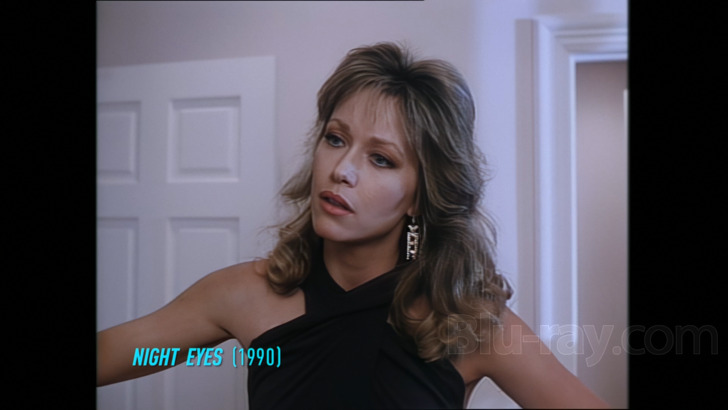
The AVC encoded image (1.78:1 aspect ratio) presentation for "We Kill for Love" explores a moody picture that's pieced together from a variety of sources. The primary documentary aspect of the endeavor retains a cooler, bluer noir look, following the Archivist in his file room, going through all the evidence. Interview footage is brighter and more natural, with rich sense of primaries on clothing choices and room decoration. Style is vivid, along with hair color, and skin tones are natural. Clips from the erotic thrillers are worked over a bit to match the look of "We Kill for Love," but remain in line with original presentations. Detail is strong during conversations, examining textured skin particulars and fibrous outfits. Interview spaces are also open for inspection. Older footage ranges in quality, but, again, there's an attempt to bring consistency to imagery, with VHS titles upscaled tastefully. Delineation is satisfactory.
We Kill for Love Blu-ray Movie, Audio Quality 
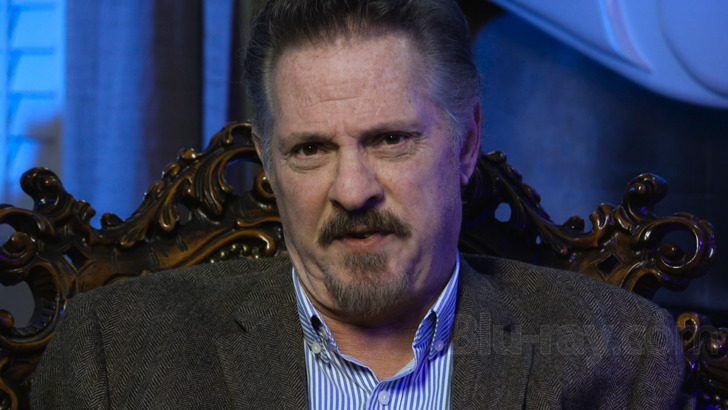
The 2.0 DTS-HD MA mix provides authoritative narration for "We Kill for Love," leading with director Anthony Penta's deeper, smoother voice to help viewers make it through the information presented. Interview audio is crisp, successfully navigating a collection of participants and their individual personalities, maintaining ideal intelligibility throughout the feature. Scoring cues set a jazzier, synth-y mood with clear instrumentation and support. Clips from various movies are also nicely balanced, with limited evidence of age and original format.
We Kill for Love Blu-ray Movie, Special Features and Extras 
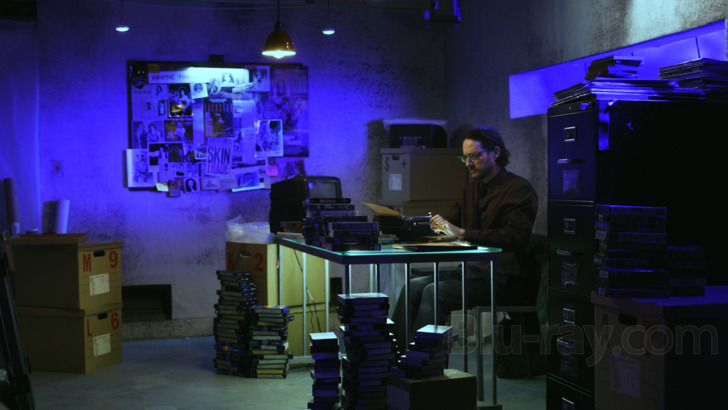
- Booklet (22 pages) contains essays by Justin LaLiberty and Anthony Penta.
- Commentary features director Anthony Penta, and film historians Travis Woods, Samm Deighan, and Douglas Keesey.
- Deleted Scenes & Interviews (HD) include "Love Scenes" (9:34), "The Intimacy Coordinator" (5:16), "The Audience" (5:39), "The Sound of Sex" (6:21), "Return" (7:42), and "Film Fandom" (2:19).
- A Trailer has not been included on this release.
We Kill for Love Blu-ray Movie, Overall Score and Recommendation 
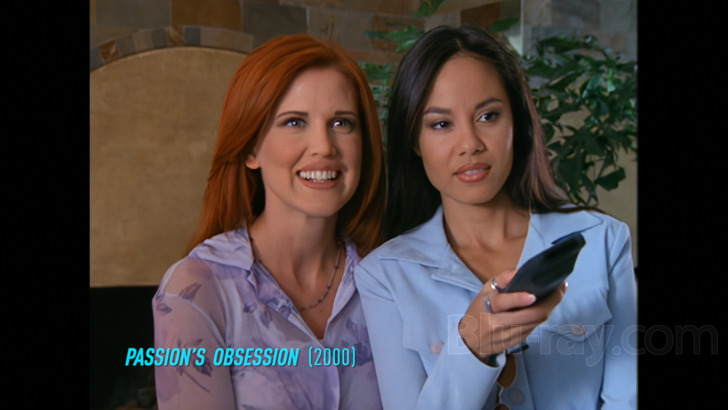
"We Kill for Love" is an exhaustive understanding of the subject, analyzing Playboy's eventual dominance of the scene, the growth of female POV with offerings such as "Red Shoe Diaries," and the shaping of a legacy, with many of the performers wrestling with labels, branded pornographers by those seeking to dismiss careers. There's a lot to the documentary, and it eventually becomes overkill at 163 minutes, with Penta showing little interest in sharpening his work, pursuing more defined points along the way. "We Kill for Love" is also a little too sterile for the subject matter its exploring, lacking a more engaged sense of play with the subgenre. The feature is absolutely informative, and it's a treat to reunite with some of the talent and hear their thoughts about the experience, but Penta doesn't know when to quit, diluting the potency of the topic and its strange development into an industry force for a short period of time.
Similar titles
Similar titles you might also like

For Madmen Only
For Madmen Only: The Stories of Del Close
2020

Let Me Die a Woman
1977

Nudist Life
10 Days in a Nudist Camp / Shangri-La Forbidden Fruit: The Golden Age of the Exploitation Picture, Vol. 14
1961

The American Dreamer
1971

Consenting Adults: A Study of Homosexuality
1967

Beauty Day
2011

At the Video Store
Slipcover in Original Exclusive Pressing
2019

Inferno Rosso: Joe D'Amato on the Road of Excess
Inferno rosso: Joe D'Amato sulla via dell'eccesso
2021

Scala!!!
Or, The Incredibly Strange Rise And Fall Of The World's Wildest Cinema And How It Influenced A Mixed-up Generation Of Weirdos And Misfits
2023

The Strange World of José Mojica Marins
2001

Kid Candidate
2021

Forbidden Love
Slipcover in Original Pressing
1992

Clapboard Jungle
2020

The Found Footage Phenomenon
Slipcover in Original Pressing
2021

Buxom Beautease
1956

The Rock-afire Explosion
Slipcover in Original Presisng
2008

How to Build a Time Machine
Slipcover in Original Pressing
2016

Mondo Freudo
1966

Woodlands Dark and Days Bewitched
2021

Gow, the Head Hunter
1928
